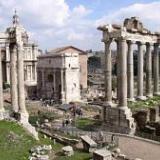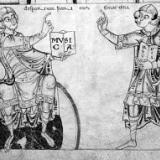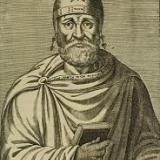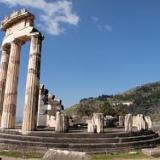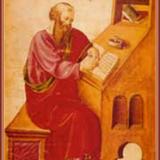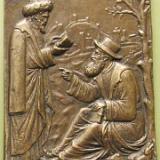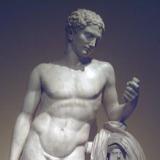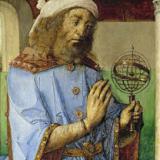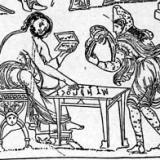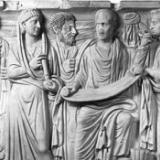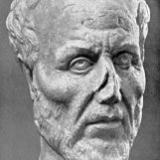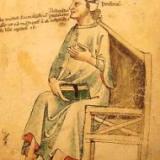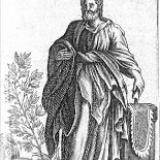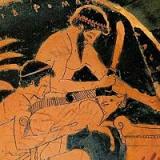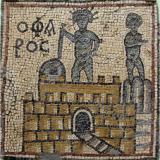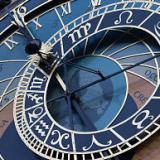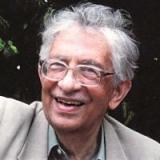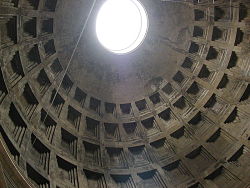Late Antiquity
As we move into late antiquity, the podcast looks at the build-up to Plotinus and the tradition known as "Neoplatonism," when Aristotle and Plato became the basis for a new synthesis of ancient thought. Major philosophical themes include the nature of the First Principle, the nature of mind and soul, and the eternity of the world. We also start to see pagan thought interacting with the religions of Judaism and Christianity. Interviews with Jan Opsomer, Serafina Cuomo, James Wilberding, Anne Sheppard, Dominic O'Meara and Richard Sorabji.
The book version of these podcasts is available from Oxford University Press.
• U. Coope, Freedom and Responsibility in Neoplatonic Thought (Oxford: 2020).
• J.M. Dillon and L.P. Gerson, Neoplatonic Philosophy: Introductory Readings (Indianapolis: 2004).
• A. Falcon (ed.), Brill’s Companion to the Reception of Aristotle in Antiquity (Leiden: 2016).
• L. Gerson (ed.), The Cambridge History of Philosophy in Late Antiquity, 2 vols (Cambridge: 2010).
• P. Remes, Neoplatonism (Stocksfield: 2008).
• P. Remes and S. Slaveva-Griffin (eds), The Routledge Handbook of Neoplatonism (London: Routledge, 2014).
• A. Smith, Philosophy in Late Antiquity (London: 2004).
• R. Sorabji, The Philosophy of the Commentators, 200-600 AD: a Sourcebook, 3 vols (London: 2004).
• R. Sorabji (ed.), Aristotle Re-Interpreted: New Findings on Seven Hundred Years of the Ancient Commentators (London: 2016).
• M. Tuominen, The Ancient Commentators on Plato and Aristotle (Stocksfield: 2009).
Posted on
Peter introduces philosophy in late antiquity, when Aristotelianism and Platonism made a comeback, and pagan philosophy developed alongside Judaism and Christianity.
Posted on
Pioneering thinkers Eudorus, Alcinous, and Numenius fuse Pythagoreanism with Platonism and pave the way for Plotinus.
Posted on
We put the Philo in philosophy this week, as Philo of Alexandria reads the Bible through the lens of Middle Platonism.
Posted on
Plutarch, a major figure of early Imperial literature, was also a Platonist philosopher. He gives us insight into Platonism before Plotinus, and also the letter E.
Posted on
Jan Opsomer helps Peter to understand principles, Plato interpretation, and Plutarch in a wide-ranging discussion of Middle Platonism.
Posted on
Peter looks at the history of Aristotelianism up the time of the Roman Empire and the beginning of commentaries on Aristotle's works.
Posted on
Alexander of Aphrodisias writes the greatest ancient commentaries on Aristotle and tries to demolish the Stoic teaching on fate.
Posted on
Peter looks at the interaction between rhetoric and philosophy in the Roman Empire, discussing authors like Quintilian, Lucian and Themistius.
Posted on
Ptolemy uses philosophy in the service of studying the stars, while philosophers of all persuasions evaluate the widespread practice of astrology.
Posted on
How did the mathematics of figures like Euclid and Archimides relate to ancient philosophy? Peter finds out in an interview with Serafina Cuomo.
Posted on
Peter introduces Plotinus, the greatest philosopher of late antiquity and the founder of Neoplatonism.
Posted on
Plotinus posits an absolutely transcendent first principle, the One. What is it (or isn’t it), and how does it relate to Intellect?
Posted on
For Plotinus, Soul is on the border between the physical and intelligible realms. Can he convince us to identify ourselves with its highest part?
Posted on
Plotinus struggles to explain the presence of suffering, evil and ugliness in a world caused by purely good principles – and tells us what role we should play in that world.
Posted on
James Wilberding joins Peter to show that contrary to what is often claimed, Neoplatonists did make contributions to the philosophy of nature. Topics include Plotinus on the cosmos and Porphyry on embryology.
Posted on
Porphyry fuses Platonism with Aristotelianism, exploring Aristotle’s logic and Plotinus’ philosophy. He also finds time to argue for vegetarianism.
Posted on
Iamblichus fuses Platonism with pagan religious conviction and sets the agenda for Neoplatonism in generations to come.
Posted on
Proclus’ system, presented in original works and in commentaries on Plato and Euclid, integrates Neoplatonic philosophy with pagan religious belief and practice.
Posted on
Anne Sheppard discusses ancient aesthetics, touching on poetry, visual art and music in thinkers from Plato to Proclus.
Posted on
Dominic O'Meara speaks with Peter about political philosophy and mathematics in Neoplatonism.
Posted on
Neoplatonism had a long-standing association with traditional Greek religion. How did philosophers respond when Christians gained ascendancy?
Posted on
John Philoponus refutes Aristotle’s and Proclus’ arguments for the eternity of the universe, and develops new ideas in physics.
Posted on
Sir Richard Sorabji, founder of the Ancient Commentators Project, joins Peter to discuss the history of ancient commentary on Aristotle.
Posted on
A special double interview with Caroline Humfress (Birkbeck College London) and Michael Trapp (King's College London) celebrates reaching 100 episodes by looking at the cultural status of philosophy in the ancient world.




